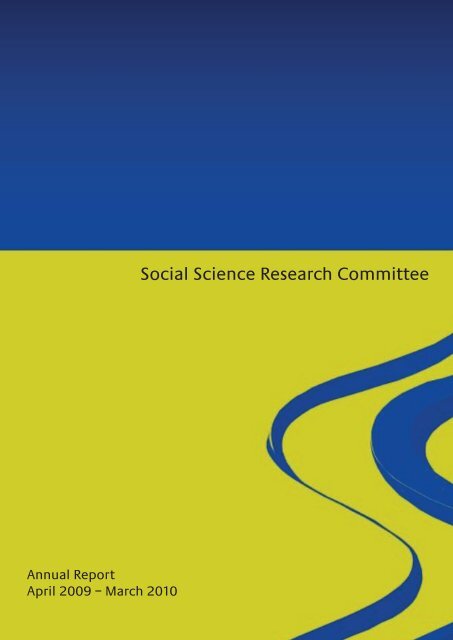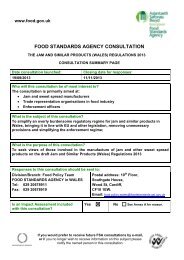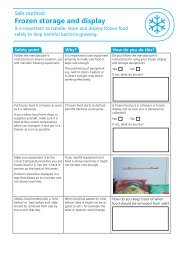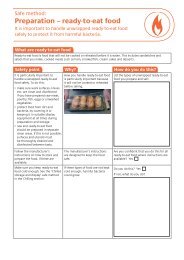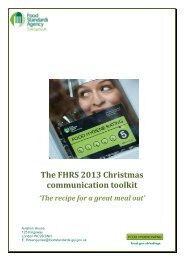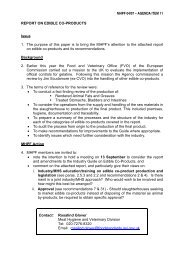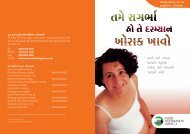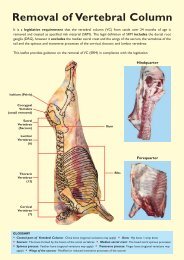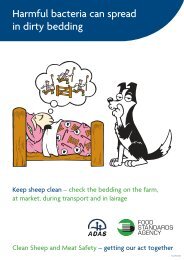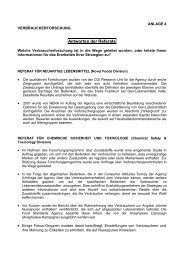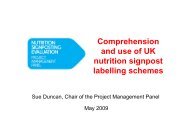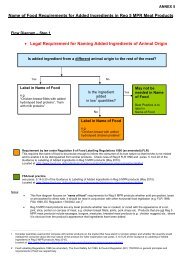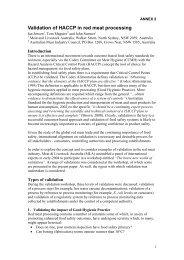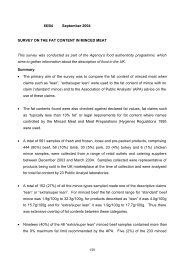Social Science Research Committee - Food Standards Agency
Social Science Research Committee - Food Standards Agency
Social Science Research Committee - Food Standards Agency
Create successful ePaper yourself
Turn your PDF publications into a flip-book with our unique Google optimized e-Paper software.
Annual Report<br />
April 2009 – March 2010<br />
<strong>Social</strong> <strong>Science</strong> <strong>Research</strong> <strong>Committee</strong>
<strong>Social</strong> <strong>Science</strong> <strong>Research</strong> <strong>Committee</strong><br />
Annual Report: April 2009 – March 2010
<strong>Social</strong> <strong>Science</strong> <strong>Research</strong> <strong>Committee</strong> – Annual Report 2010
Contents<br />
Page<br />
Foreword 3<br />
1. Introduction 4<br />
2. About the SSRC 5<br />
3. <strong>Committee</strong> Membership 7<br />
4. The SSRC’s Work in 2009/2010<br />
2009 2010 16<br />
Glossary 22<br />
Annex 1 SSRC Code of Practice 23<br />
Annex 2 SSRC Work Programme for 2008 31<br />
Annex 3 Listeria Working Group Scope of Work 34<br />
Annex 4 SSRC Members – Register of Members Interests 36<br />
1
2<br />
<strong>Social</strong> <strong>Science</strong> <strong>Research</strong> <strong>Committee</strong> – Annual Report 2010
Foreword<br />
I am pleased to present the second Annual Report of the <strong>Social</strong> <strong>Science</strong> <strong>Research</strong><br />
<strong>Committee</strong> (SSRC) covering the financial year 2009–2010.<br />
The <strong>Committee</strong>’s second year has been a full one. We have made significant<br />
progress on the work we started in our first year and have also become more<br />
closely involved in the <strong>Agency</strong>’s wider role in relation to food safety.<br />
In particular, the <strong>Agency</strong>’s Advisory <strong>Committee</strong> on the Microbiological Safety of<br />
<strong>Food</strong> (ACMSF) sought the <strong>Committee</strong>’s advice on whether the food consumption characteristics, storage and<br />
food preparation patterns among people aged over 60 might be contributing to their raised incidence of<br />
listeriosis. This was our first experience of cross-committee collaboration. When we presented our report to<br />
the ACMSF in September, I am glad to say that our recommendations were accepted and are now being<br />
taken forward by the <strong>Agency</strong>. We hope to get involved in more work with Scientific Advisory <strong>Committee</strong>s in<br />
the coming years.<br />
As a social survey specialist, I am particularly pleased that the <strong>Agency</strong> adopted the SSRC’s recommendation to<br />
establish a regular new time series on public attitudes and behaviour in relation to food. The first round of<br />
the <strong>Food</strong> Issues Survey is already in the field and a second wave is being prepared for 2011. Apart from its<br />
primary goal of monitoring and understanding people’s attitudes, perceptions and behaviour patterns, the<br />
survey will also prove valuable as a potential sampling frame for further research among people with certain<br />
characteristics that would otherwise be difficult to locate.<br />
We have also recommended to the ACMSF a small project into kitchen behaviour in an attempt to identify<br />
possible factors in the spread of listeriosis. Meanwhile, we are developing a special module on attitudes to risk<br />
and their relationship to food choices for inclusion in the 2011 survey. Members of the SSRC are closely<br />
involved in these developments.<br />
In 2009–2010 the secretariat and members of the <strong>Committee</strong> served on the commissioning panel set up to<br />
determine the first project as part of a strategic partnership we have forged with the Economic and <strong>Social</strong><br />
<strong>Research</strong> Council (ESRC). We are working with the successful applicant – the Thomas Coram <strong>Research</strong> Unit at<br />
the Institute of Education (IoE).<br />
During the year other work has included contributing to <strong>Agency</strong> consultations on its portfolio of nutrition<br />
research and to its response to the Biotechnology and Biological <strong>Science</strong>s <strong>Research</strong> Council’s (BBSRC’s) new<br />
food sustainability programme.<br />
I regret to say that this will be my last report in this role as I am stepping down as Chair following the<br />
<strong>Committee</strong>’s meeting in April 2010. I have greatly enjoyed working with the SSRC and the <strong>Agency</strong> and am<br />
pleased that we have collectively made such a sure start to our work. My warm thanks go to the members of<br />
the SSRC for their insight and energy and, on their behalf and mine, to the secretariat for their continued<br />
efficiency and commitment. Jane Barrett and her colleagues deserve our warm congratulations and a big<br />
vote of thanks.<br />
Professor Sir Roger Jowell<br />
Chair<br />
3
4<br />
<strong>Social</strong> <strong>Science</strong> <strong>Research</strong> <strong>Committee</strong> – Annual Report 2010<br />
1. Introduction<br />
This is the second annual report of the <strong>Social</strong> <strong>Science</strong> <strong>Research</strong> <strong>Committee</strong> (SSRC) and covers the financial<br />
year 2009–2010.<br />
The SSRC is one of the Scientific Advisory <strong>Committee</strong>s (SACs) that advise the <strong>Food</strong> <strong>Standards</strong> <strong>Agency</strong>. It<br />
was established in April 2008 to help the <strong>Agency</strong> strengthen its capacity for social science research and to<br />
provide advice to the <strong>Agency</strong> about how it gathers and uses social science evidence.<br />
The SSRC is one of the <strong>Agency</strong>’s cross-cutting committees (the other being the General Advisory<br />
<strong>Committee</strong> on <strong>Science</strong> – GACS 1 ) and so works across the remit of the <strong>Agency</strong>.<br />
The <strong>Committee</strong> met twice in the reporting period (20 May 2009 and 20 October 2009). Established subgroups<br />
built on the work started in 2008 in specific areas:<br />
● Providing assurance that social science research is included appropriately in the <strong>Agency</strong>’s <strong>Science</strong><br />
and Evidence Strategy<br />
● Overseeing the pilot and testing phases of the <strong>Food</strong> Issues Survey (FIS) in advance of fieldwork<br />
commencing in March 2010<br />
● Commissioning a project in response to the first joint call as part of the <strong>Agency</strong>’s strategic<br />
collaboration with the Economic and <strong>Social</strong> <strong>Research</strong> Council (ESRC)<br />
● A working group advised how social science evidence could help explain why people over the<br />
age of 60 are more susceptible to listeriosis than other age groups<br />
In addition, the <strong>Committee</strong> has supported the <strong>Agency</strong> in using and further developing the Register of<br />
Specialists as a tool to engage experts in different social science and related fields with the <strong>Agency</strong>’s social<br />
science research.<br />
This annual report sets out the work undertaken during the <strong>Committee</strong>’s second year.<br />
1 For more information on GACS see gacs.food.gov.uk/
2. About the SSRC<br />
The <strong>Agency</strong>’s Strategic Plan 2005–2010 and accompanying <strong>Science</strong> and Evidence Strategy 2005–2010,<br />
recognised the need to increase access to the social sciences to enhance the <strong>Agency</strong>’s evidence base and<br />
help it to develop, implement and assess the social impact of its advice and policies 2 .<br />
The <strong>Agency</strong>’s capacity for social science has been strengthened over the past two and a half years. The<br />
<strong>Agency</strong> draws on the expertise of the <strong>Social</strong> <strong>Science</strong> <strong>Research</strong> Unit (SSRU) and advice from the SSRC in<br />
developing its social science evidence base.<br />
Furthermore, the <strong>Agency</strong>’s new Strategic Plan (2010-2015 3 ) highlights the importance of a science and<br />
evidence base to deliver the strategic objective:<br />
“to improve food safety and the balance of people’s diet by 2015”<br />
The accompanying <strong>Science</strong> and Evidence Strategy 2010-2015 4 details how the <strong>Agency</strong> will use science and<br />
evidence to deliver this objective, including a key role for social science research in the underlying priority<br />
evidence themes aimed at addressing the strategic outcomes.<br />
The next five years will be an exciting and challenging time for the <strong>Committee</strong> to build upon its successes<br />
over the first two years and continue to support the <strong>Agency</strong> in delivering its new strategy.<br />
<strong>Committee</strong> remit:<br />
The SSRC was formally established in April 2008 5 . Sir Roger Jowell was appointed chair together with<br />
11 members – 9 independent expert members and 2 lay members 6 . <strong>Agency</strong> Scientific Advisory <strong>Committee</strong>s<br />
(SACs) have deputy chairs and Peter Jackson was nominated as deputy chair by SSRC members.<br />
During its second year the SSRC has successfully helped the <strong>Agency</strong> strengthen its capacity for social<br />
science research and over the next five years will continue to do so. It provides assurance to the <strong>Agency</strong>’s<br />
Board about how the <strong>Agency</strong> gathers and uses social science evidence and advice.<br />
The terms of reference for the <strong>Social</strong> <strong>Science</strong> <strong>Research</strong> <strong>Committee</strong> are:<br />
● To advise and critically assess how the <strong>Agency</strong> gathers and uses social science evidence and advice<br />
● To draw on wider expertise, as appropriate, to provide independent critique on social science<br />
based evidence<br />
● To support the <strong>Agency</strong> develop its social science capacity by advising how social science can<br />
best contribute to meeting the <strong>Agency</strong>’s strategic aims<br />
● To keep the <strong>Agency</strong> in touch with relevant social science activity both in the UK and internationally<br />
2 FSA strategic plan 2005–2010: food.gov.uk/multimedia/pdfs/stratplan0510.pdf<br />
<strong>Science</strong> and Evidence strategy 2005–2010: food.gov.uk/multimedia/pdfs/sciencestrategy.pdf<br />
3 food.gov.uk/aboutus/publications/busreps/strategicplan/<br />
4 food.gov.uk/multimedia/pdfs/publication/sciencestrategy0210.pdf<br />
5 The appointments process was carried out in accordance with best practice guidelines set out by the Office for the commission of Public<br />
Appointments. For more information see: publicappointmentscommissioner.org/<br />
6 Section 3 provides details of the chair and members. Biographies of SSRC members can be found at ssrc.food.gov.uk/aboutus/membersofssrc<br />
5
6<br />
<strong>Social</strong> <strong>Science</strong> <strong>Research</strong> <strong>Committee</strong> – Annual Report 2010<br />
SSRC secretariat:<br />
The SSRC is supported in its work by a secretariat drawn from <strong>Agency</strong> staff based in the SSRU. The<br />
secretariat members are:<br />
Jane Barrett,<br />
Secretary and Head of<br />
<strong>Social</strong> <strong>Science</strong> <strong>Research</strong> Siân Thomas Jude Heller Gerard Melder<br />
How the SSRC operates:<br />
The SSRC meets twice a year. Details of the SSRC members’ roles and responsibilities are provided in the<br />
SSRC Code of Practice 7 . This was agreed by the <strong>Committee</strong> at the inaugural SSRC meeting in July 2008.<br />
All SAC members are public appointments and as such are expected to provide details of any interests<br />
they may hold and the approach to declaring any interests has been set out in the SSRC Code of Practice.<br />
The SSRC secretariat has produced a Register of Members’ interests 8 . The register is a living document and<br />
members are asked to provide an update should their registered interests change.<br />
During its second year, the SSRC met on 20 May and 20 October 2009. Both meetings were open to the<br />
public and observers were encouraged to attend. Meeting papers were posted on the SSRC pages of the<br />
<strong>Agency</strong>’s website in advance of each meeting and minutes were added soon after each meeting 9 .<br />
In its first year the SSRC formed three sub-groups and one working group to take forward work in specific<br />
areas. The progress of these groups during year two are provided in section 4.<br />
7 Annex 1: SSRC Code of Practice<br />
8 Annex 4: SSRC Register of Members’ interests ; the Register of Members’ interests can also be found at<br />
ssrc.food.gov.uk/aboutus/ssrcmemberinterests<br />
9 Full details of the agenda, papers and minutes of the meetings are available at<br />
ssrc.food.gov.uk/meetings/
3. Membership<br />
<strong>Committee</strong> members bring a wide range of expertise in the social sciences including geography, social<br />
anthropology, sociology, economics, population studies, psychology, environmental health, public health<br />
nutrition, government (local and central) and the voluntary sector. 10<br />
The chair of the SSRC and each of the members set out below what their individual disciplines and areas<br />
of expertise bring to the <strong>Agency</strong> and its work.<br />
Roger Jowell<br />
Roger is the Director of the Centre for Comparative <strong>Social</strong> Surveys at City University London and<br />
the International Coordinator of the European <strong>Social</strong> Survey (ESS). He is also the Deputy Chair of<br />
the UK Statistics Authority<br />
My whole professional background has been in social research with a strong focus<br />
on monitoring and interpreting social and political change. Having co-founded<br />
and directed the National Centre for <strong>Social</strong> <strong>Research</strong> (formerly SCPR) for nearly<br />
thirty years, I have since founded a new academic centre for comparative<br />
research at City University, which is the headquarters institution of the ESS – a<br />
34-nation biennial survey of value change throughout Europe.<br />
While at NatCen, I co-directed the British Election Series and the British <strong>Social</strong><br />
Attitudes survey time series (in each case from 1983 to 2000). This experience<br />
prompted me to initiate a <strong>Food</strong> Issues Survey here at the <strong>Agency</strong> which I am delighted to report has<br />
readily been adopted as part of its regular programme of research. The survey’s purpose is to monitor<br />
people’s changing attitudes and behaviour in relation to food. It will complement the regular scientific<br />
research which the <strong>Agency</strong> already produces.<br />
My recent experience of research throughout Europe suggests strongly to me that the great divide that<br />
once existed between scientific research on the one hand and social scientific research on the other is<br />
now being breached – a welcome and long overdue development which I have pursued throughout my<br />
research career.<br />
10 Biographies of SSRC members can be found at<br />
ssrc.food.gov.uk/aboutus/membersofssrc<br />
7
8<br />
<strong>Social</strong> <strong>Science</strong> <strong>Research</strong> <strong>Committee</strong> – Annual Report 2010<br />
Mary Brennan<br />
Mary is a senior lecturer in marketing at the University of Newcastle<br />
I am a Senior Lecturer in Marketing at the University of Newcastle upon Tyne. I am<br />
degree programme director of the successful BSc. (Hons) Marketing programme<br />
at Newcastle and heavily involved in the delivery of our new MSc. Advanced <strong>Food</strong><br />
Marketing.<br />
My primary research specialises in <strong>Food</strong> and <strong>Social</strong> Marketing. I have gained<br />
extensive food related consumer and policy research experience over the ten<br />
years of my academic career. I have led or been involved in a range of food<br />
related research projects including projects on domestic food safety practices (<strong>Food</strong> Safety Promotions<br />
Board Ireland); communicating food risk uncertainty to the public (<strong>Food</strong> <strong>Standards</strong> <strong>Agency</strong>); consumer<br />
quality and safety perceptions of organic and low input food (EU Framework 6 Programme); and lay and<br />
expert engagement (ESRC <strong>Science</strong> in Society programme).<br />
I have published in a range of journals including: Appetite, <strong>Food</strong> Quality and Preference; Journal of <strong>Food</strong><br />
Safety; Public Understanding of <strong>Science</strong>; British <strong>Food</strong> Journal and the Journal of Marketing Management.<br />
In addition, I am currently Chair of the International Life <strong>Science</strong>s Institute’s Consumer <strong>Science</strong> Expert<br />
Group on Consumers Risk Perception of <strong>Food</strong> Choice. The common thread that has flowed through my<br />
research investigations has been the dilemma, faced by many different food policy and practice<br />
stakeholders, of little or no behavioural change amongst the public with respect to a variety of public<br />
health and food safety campaigns.<br />
During the last year I have been a member of the working group set up to advise and support the ACMSF<br />
in relation to listeria and the over 60s; and contributed to the advice note prepared for the ACMSF.<br />
Dr Steven Cummins<br />
Steven is Senior Lecturer and NIHR Fellow in the Department of Geography, Queen Mary<br />
University of London<br />
I am an interdisciplinary social science researcher with training in geography,<br />
epidemiology and public health. My primary areas of expertise lie in the contextual<br />
and socio-environmental determinants of health (particularly the environmental risk<br />
factors for poor diet and diet-related chronic disease); the design and evaluation of<br />
community social and policy interventions to improve population health and the<br />
consumer consequences of food retail restructuring.<br />
Such interests go some way in helping the SSRC develop informed and well-rounded<br />
research and policy options that tackle the current major policy issues that fall within the <strong>Agency</strong>’s remit<br />
including obesity prevention, changing dietary behaviour and helping to protect consumer choice with<br />
particular emphasis on issues of food access and affordability.
Seeing the challenges the <strong>Agency</strong> faces through a geographical lens allows a unique perspective – how<br />
human behaviour is shaped by, and related to, the wider social, cultural, political and environmental context.<br />
Understanding these relationships and processes will allow the development of better research, and in turn,<br />
better policy.<br />
I have contributed to the <strong>Committee</strong>’s response to a number of the <strong>Agency</strong>’s consultations, including the<br />
Review of Nutrition Programmes and the <strong>Agency</strong>’s Strategic Plan 2010–2015. In addition, I have reviewed<br />
and provided advice on a number of <strong>Agency</strong> research projects. I also provided comments on a late draft<br />
of the <strong>Agency</strong>’s new <strong>Science</strong> and Evidence Strategy 2010–2015 to ensure that social science research was<br />
properly integrated and represented within the <strong>Agency</strong>’s future plans.<br />
Joy Dobbs<br />
Joy works for the Office for National Statistics (ONS) but is currently on secondment as a<br />
consultant to the National Council of Voluntary Organisations<br />
Knowledge, expertise and experience in social surveys and survey methods has<br />
enabled me to give advice to ensure the survey research carried out by the<br />
<strong>Agency</strong> is of good quality and uses appropriate methods, so that the <strong>Agency</strong>’s<br />
findings will be credible, accepted and trusted by all.<br />
Experience of drawing up and implementing strategies and programmes of<br />
research has enabled me to advise on the social science research strategy and<br />
how best to implement it.<br />
Experience of managing research within Government departments has allowed me to advise on what is<br />
important and achievable for a research strategy within an organisation like the <strong>Agency</strong>, especially the<br />
need for policy relevance and what is realistic within the practical and other constraints.<br />
Experience of working with ESRC in other fields has been useful in me assisting Jane and colleagues in<br />
setting up the joint <strong>Agency</strong>/ESRC research collaboration and the call for research proposals.<br />
Previous knowledge and experience of the National Diet and Nutrition Survey (NDNS) has enabled me to<br />
advise on how to make best use of this important resource to assist other social science work, including<br />
the work with the ESRC.<br />
During the <strong>Committee</strong>’s second year, in addition to contributing actively to discussions at SSRC meetings,<br />
I have worked on two main areas. First, the FSA/ESRC strategic partnership and first research call, for which<br />
my previous experience of working with ESRC was valuable and where I sat on the commissioning panel.<br />
Second, the new <strong>Food</strong> Issues Survey – as an active member of the FIS advisory group my survey<br />
experience and expertise has proved helpful to the SSRU project managers.<br />
9
10<br />
<strong>Social</strong> <strong>Science</strong> <strong>Research</strong> <strong>Committee</strong> – Annual Report 2010<br />
Ben Fine<br />
Ben is Professor of Economics at the School of Oriental and African Studies, University of London<br />
I have developed my own approach to the determinants of consumption in<br />
general, the systems of provision approach, and have applied it in particular to the<br />
food system. For this, it is seen to be necessary to study the determinants of<br />
consumption all along the chain of provision as an integral structure, and to see<br />
the material processes, structures and agents involved, from producers through to<br />
the consumers themselves, as simultaneously creating and reflecting upon the<br />
meanings of foods that are generated and the roles they play in daily lives.<br />
Such an approach allows for an understanding both of the departure of patterns of food consumption away<br />
from recommended healthy diets, and how campaigns to improve diets may or may not be effective. The<br />
system of provision approach has been applied in detail to the UK, with special attention to the dairy, meat<br />
and sugar systems. And it can also shed light on the growing and shifting incidence of eating disorders.<br />
The approach also offers a framework within which continuing study of the determinants of eating habits<br />
can be incorporated.<br />
As a committee member, over the last 12 months I have contributed to the SSRC’s response to FSA public<br />
consultations including the FSA Strategic Plan 2010–2015 and The Nutrition Review. I have also played an<br />
active role at committee meetings particularly in relation to people’s changing behaviours in the recession<br />
and how this impacts on the work of the <strong>Agency</strong> and the SSRC.<br />
Arthur Fleiss<br />
Arthur formerly worked in government research, latterly at the Department for Work and<br />
Pensions. In 2009 he gained a German translation diploma<br />
I studied social anthropology at Cambridge and Sussex, gaining a D.Phil. in 1973.<br />
Understanding cultural and social influences on people’s perceptions, world views<br />
and behaviour has been central to my research career which, alarmingly, now<br />
spans 35 years. I’ve covered a lot of ground in the public and voluntary sectors,<br />
much of it doing policy related research and evaluation in government. I designed<br />
and managed the first evaluation of Jobseeker’s Allowance in the mid 1990s and,<br />
most recently, led a Department for Work and Pensions research programme on<br />
pensions, including attitudes and behaviour relating to retirement saving. In the<br />
mid 1980s I led the evaluation of a large programme of appropriate technologies in Mali, West Africa<br />
which presented both methodological and ethical challenges – for example, conducting research on the<br />
use of fuel efficient stoves at a time of food scarcity in parts of Mali. I’ve also conducted research and<br />
evaluation on the Indian subcontinent and in Kenya and Madagascar and, while working for the Wellcome<br />
Trust, researched public engagement with scientific topics and scientists’ communication with the public.
My experience of designing, commissioning and managing research on a wide range of topics in and<br />
outside government has provided valuable lessons for my SSRC work. To influence attitudes and behaviour<br />
relating to food safety and consumption the <strong>Agency</strong> requires a detailed understanding of the role of food<br />
in people’s lives: how purchase, preparation and consumption are linked to the priorities, economic<br />
circumstances, lifestages, background and culture of different individuals and social groups. Robust social<br />
research evidence on the complexities and interplay of these factors will enable the <strong>Agency</strong> to devise and<br />
implement appropriate interventions.<br />
Working with Ministers and policy managers, and designing, managing and commissioning research in so<br />
many different contexts has given me an excellent understanding of appropriate research methods, of<br />
research procurement and of the importance of ethical considerations.<br />
In the second year of the SSRC, having helped review the <strong>Agency</strong>’s Consumer Attitudes Survey, I went on<br />
to join the advisory group for the new <strong>Food</strong> Issues Survey. Bringing my experience of government surveys<br />
to the group, I provided ongoing advice and support to the SSRU team and contributed to the design and<br />
development of the questionnaire. I also contributed to the process of procuring research contractors for<br />
the survey, and participated in the <strong>Agency</strong>’s wider discussions about developing a social research<br />
framework. Finally, I provided advice to SSRU on their research to evaluate the provision of calorie<br />
information in catering outlets.<br />
Michael Howard<br />
Michael is a lecturer in environmental health and works from the Department of Geography at<br />
King’s College, London<br />
I have expertise in the areas of food safety, enforcement and the promotion of<br />
compliance in food businesses, especially for small and medium sized enterprises<br />
(SMEs). I am interested in the relationships between the <strong>Agency</strong>’s regulatory<br />
activities and those of other regulators and enforcement agencies, such as the<br />
Health and Safety Executive, and how these relationships impact on food<br />
businesses. I have also been looking at the ways in which the <strong>Agency</strong> is able to<br />
tap in to the resources of enforcement agencies to promote its wider messages. I<br />
have published research on the way in which people perceive food safety risks as<br />
compared to other risks in their lives, as well as the way in which this affects their<br />
attitude to food safety and food hygiene practices. I have conducted research with chefs and other food<br />
handlers looking at the reasons why they do not always follow food safety guidance, which is important for<br />
the <strong>Agency</strong> to know about when developing food safety messages.<br />
I led the SSRC working group on Listeria monocytogenes and the food storage habits of the over 60s at<br />
home. I also, with Peter Jackson, presented the findings of the group to the ACMSF and to a meeting of<br />
the SSRC itself.<br />
I attended, with Richard Shepherd, the three-day workshop on campylobacter held jointly by the <strong>Agency</strong>,<br />
the Biotechnology and Biological <strong>Science</strong>s <strong>Research</strong> Council (BBSC) and Defra. The work conducted at this<br />
meeting will feed directly into the joint research strategy on campylobacter.<br />
11
12<br />
<strong>Social</strong> <strong>Science</strong> <strong>Research</strong> <strong>Committee</strong> – Annual Report 2010<br />
Peter Jackson<br />
Peter is Professor of Human Geography at the University of Sheffield<br />
My research focuses on the social and cultural aspects of food consumption.<br />
I was Director of the ‘Changing Families, Changing <strong>Food</strong>’ research programme<br />
(2005–2008), funded by the Leverhulme Trust 11 and recently began a new project<br />
on ‘Consumer anxieties about food’ (2009–2012), funded by the European<br />
<strong>Research</strong> Council.<br />
Previous projects include a study of transnational commodity culture (funded by<br />
ESRC’s Transnational Communities programme, 1999–2002), an analysis of retail<br />
competition and household consumption practices (ESRC, 2001–2004) and a study of food commodity<br />
chains (funded by the AHRC-ESRC Cultures of Consumption programme, 2003–2007).<br />
I am also involved in a number of knowledge exchange initiatives including the development of an<br />
educational website, <strong>Food</strong> Stories, hosted by the British Library 12 and an exhibition entitled ‘<strong>Food</strong>, Glorious<br />
<strong>Food</strong>’ held at Weston Park Museum and developed in conjunction with Museums Sheffield.<br />
During the last 12 months I have been a member of the selection panel for the FSA-ESRC Dietary Decisions<br />
research programme and participated in the SSRC's listeria working group, helping to prepare a report for<br />
the ACMSF. In my role as deputy chair, I have chaired a meeting of the SSRC and attended meetings of<br />
GACS as the SSRC representative.<br />
Richard Shepherd<br />
Richard is Professor of Psychology and Co-Director of the <strong>Food</strong>, Consumer Behaviour and Health<br />
<strong>Research</strong> Centre at the University of Surrey<br />
My research is mainly concerned with understanding the reasons for people’s<br />
choice of foods. This has involved the development and application of social<br />
psychological models of attitudes and beliefs to understanding food choice, risk<br />
perception, risk communication and public engagement. The work on risk<br />
perception, communication and engagement has included food applications such<br />
as genetic medication, and other forms of risks.<br />
I am a Chartered Health Psychologist and a Fellow of the British Psychological<br />
Society. I am a Fellow for <strong>Food</strong> <strong>Standards</strong> Australia and New Zealand providing<br />
advice on the social science aspects of food policy. Previously I was programme manager of the LINK<br />
Programme on Eating, <strong>Food</strong> and Health jointly sponsored by the Economic and <strong>Social</strong> <strong>Research</strong> Council,<br />
Biotechnology and Biological <strong>Science</strong>s <strong>Research</strong> Council and the Department for Environment, <strong>Food</strong> and<br />
Rural Affairs.<br />
11 sheffield.ac.uk/familiesandfood<br />
12 bl.uk/learning/histcitizen/foodstories
The areas of dietary behaviour and risk perception and communication are key parts of the <strong>Agency</strong>’s<br />
remit. It is important to understand both the determinants of behaviour and also how behaviour might be<br />
influenced in order, for example, to improve dietary behaviour. While my background is in psychology, I<br />
have worked on many multi- and inter-disciplinary projects which have spanned social and natural<br />
sciences. Such multidisciplinary approaches are key to addressing many of the issues facing the <strong>Agency</strong>.<br />
I have been an active member of the <strong>Committee</strong> over the last year attending a three day workshop on<br />
campylobacter to inform a joint research strategy for the <strong>Agency</strong>, Defra and the BBSRC and also attending<br />
the FSA workshop ‘Developing a <strong>Social</strong> <strong>Science</strong> <strong>Research</strong> Framework’ for the <strong>Agency</strong>.<br />
Ann Williams<br />
Ann has a background in community engagement including establishing and running Citizens<br />
Advice Bureaux across the North West of England. She is currently working for Liverpool City<br />
Council and Liverpool Primary Care Trust (PCT) to develop a joint commissioning advocacy<br />
strategy ahead of the changes to the Mental Health Act and the introduction of new Mental<br />
Health Advocates<br />
I am passionate about improving the quality and equity of public services,<br />
something which has been a major part of my life since the birth of my<br />
premature son. His complex health needs in his early years led us through many<br />
hospitals and I realised that not everyone received the same treatments. I joined<br />
Citizens Advice Bureau as a manager and whilst running a CAB within an acute<br />
hospital became aware of the realities of health inequalities.<br />
I helped to establish the Independent Complaints Advocacy Services (ICAS) which<br />
has helped many thousands of people through the NHS complaints procedure. I have been a long<br />
standing member of Cheshire Local <strong>Research</strong> Ethics <strong>Committee</strong> and was part of the National Institute for<br />
Health and Clinical Excellence (NICE) Public Health Programme Development Group on Behaviour Change.<br />
My current role as Senior Improvement Officer for advocacy working to give the most vulnerable groups a<br />
voice again heightens my awareness of inequalities in society.<br />
I bring to the SSRC an understanding that successful interventions to encourage a healthier diet and good<br />
food hygiene have to be based in the real world as well as based on good science, which often is devised<br />
in dry academic settings.<br />
Over the last 12 months of the SSRC I have supported the SSRU by commenting on the wave 1 <strong>Food</strong> Issues<br />
Survey questionnaire and responded to the FSA strategy 2010–2015 consultation as an SSRC member. In<br />
addition, I have been representing the <strong>Committee</strong> on a project advisory board for one of the <strong>Agency</strong>’s<br />
nutrition research projects and attended the SSRU workshop ‘Developing a <strong>Social</strong> <strong>Science</strong> <strong>Research</strong><br />
Framework’ for the <strong>Agency</strong>.<br />
13
14<br />
<strong>Social</strong> <strong>Science</strong> <strong>Research</strong> <strong>Committee</strong> – Annual Report 2010<br />
Laura Willoughby<br />
Laura is an elected councillor in the London Borough of Islington and was, until recently, Chief<br />
Executive of an HIV and Nutrition charity<br />
I have been an elected councillor for ten years on an inner London local authority and<br />
have considerable experience of championing residents’ issues to improve local<br />
services.<br />
I have experience and interest in equalities, regeneration, leisure, voluntary sector and<br />
health, dealing with issues around food safety, food poverty and health inequalities as<br />
part of this role. Until recently, I was Chief Executive of a charity delivering nutrition<br />
services to people with HIV and HIV related illnesses and am currently a political<br />
advisor at London Councils.<br />
I also sit on the Big Lottery Fund Reaching Communities Board and the Nags Head Town Centre Management<br />
<strong>Committee</strong> in Islington.<br />
It has been interesting being a lay member on a committee of talented and respected scientists. I guess our job<br />
is to make sure that the <strong>Committee</strong>'s work makes sense to the world outside. In that capacity I was part of the<br />
listeria working group - scoping what the group should look at and how to take findings forward in a way that is<br />
useful to people and organisations that work with older people is something that I am proud of.<br />
Wendy Wills<br />
Wendy is a Senior <strong>Research</strong> Fellow in the Centre for <strong>Research</strong> in Primary and Community Care at<br />
the University of Hertfordshire. She is a sociologist and a registered public health nutritionist<br />
Relationships are at the heart of sociological inquiry; ‘people’ and how they act,<br />
behave and feel in relation to other people and ‘things’ is what drives sociology as a<br />
discipline. <strong>Food</strong> is produced, bought and eaten by people whose relationship to it<br />
and to others in the food chain, be they farmer, supermarket assistant, husband or<br />
child is crucial to how the <strong>Agency</strong> needs to understand its business of promoting<br />
the safety of food and encouraging and supporting ‘healthy’ food choices.<br />
In my own research I tend to utilise mainly qualitative methods as these are useful<br />
to find out what food and eating ‘mean’ to people, particularly families with children, which is often my<br />
focus. Talking to people, either through interviews or focus groups, or using more novel methods, means<br />
that everyday experiences of food and eating are brought to life. These experiences are a powerful way of<br />
highlighting to stakeholders how to move forward in developing initiatives that work with peoples’<br />
experiences, rather than sidelining them for generic policy messages.
I am co-convenor of the British Sociological Association’s specialist <strong>Food</strong> Study Group; 13 this acts as a<br />
network for (over 200) individuals interested in the sociological study of food.<br />
During my second year as a committee member I have supported the <strong>Agency</strong> by commenting and<br />
advising on the draft questionnaire for the first <strong>Food</strong> Issues Survey. In addition, I was one of the social<br />
science representatives on the steering panel for the GO-<strong>Science</strong> FSA review and I have actively<br />
contributed to SSRC responses to the <strong>Agency</strong>’s consultations, including the FSA’s strategy 2010–2015.<br />
13 food-study-group.org.uk<br />
15
16<br />
<strong>Social</strong> <strong>Science</strong> <strong>Research</strong> <strong>Committee</strong> – Annual Report 2010<br />
4. SSRC’s work in 2009/2010<br />
The <strong>Committee</strong>’s medium term work programme has been structured to cover each of the four SSRC Terms<br />
of Reference 14 . During its first year the SSRC established three sub-groups and one working group. These<br />
continued their work through the <strong>Committee</strong>’s second year.<br />
Additionally, Roger and Peter have each attended a GACS meeting representing the SSRC.<br />
Advising and critically assessing how the <strong>Agency</strong> gathers and uses<br />
social science evidence and advice<br />
This has generated several key pieces of work this year:<br />
Development of the <strong>Food</strong> Issues Survey (FIS)<br />
One of the first activities the <strong>Committee</strong> undertook was a review of the <strong>Agency</strong>’s annual Consumer Attitude<br />
Survey. Roger Jowell and Arthur Fleiss led this work on behalf of the SSRC and in November 2008 the SSRC<br />
endorsed the recommendation that the <strong>Agency</strong> should establish a new time series so that the annual<br />
attitudes research can pass the same tests of robustness as the rest of the <strong>Agency</strong>’s scientific research.<br />
At the <strong>Committee</strong>’s suggestion, the <strong>Agency</strong> commissioned a scoping study on attitudes and behaviours<br />
towards food. This study investigated a range of research from academic, governmental, NGOs and<br />
commercial sources, and produced a data catalogue to inform question framing in the new survey.<br />
The <strong>Agency</strong> has now set up FIS: “<strong>Food</strong> and You”. Following a competitive tender exercise via the Official<br />
Journal of the European Union, a consortium of TNS-BMRB, the Policy Studies Institute and the University of<br />
Westminster was commissioned to carry out the survey on behalf of the <strong>Agency</strong>.<br />
An advisory group was set up that included Arthur Fleiss and Joy Dobbs from the SSRC who have both<br />
been pivotal in the design and development of the survey.<br />
As recommended by the SSRC, the new survey is based on a random probability sample drawn from the<br />
Postcode Address File and collects information on views, attitudes and behaviours towards food issues.<br />
The survey, designed to be repeated annually, consists of approximately 3,500 face-to-face interviews.<br />
The interviews will last around 60 minutes covering a wide range of <strong>Agency</strong> interests and issues including<br />
healthy eating, food safety, eating out and shopping. The devolved administrations in Scotland and<br />
Northern Ireland elected to boost the samples within their countries to allow analysis within country.<br />
The SSRU has secured funding for the second wave of FIS in 2011. Following a review of the first wave,<br />
including lessons learnt, development work for wave 2 is scheduled to begin in August 2010 with fieldwork<br />
beginning in April/May 2011.<br />
14 See section 2 and annex 2
The <strong>Food</strong> Issues Survey – a view from the <strong>Committee</strong> by Arthur Fleiss<br />
March 2010 marked the beginning of fieldwork for the <strong>Agency</strong>’s major new survey of public attitudes<br />
and behaviours relating to healthy eating and food safety – an important moment for all those<br />
involved in the gestation and birth of the survey.<br />
Looking back to November 2008, when the SSRC endorsed proposals for a new survey, it is clear just<br />
how far we have come. In February 2010 the <strong>Agency</strong>’s new <strong>Science</strong> and Evidence Strategy 15<br />
highlighted the survey as a key source of evidence. This should ensure that a rich new set of data is<br />
well used by the <strong>Agency</strong> over the coming years.<br />
During the past year much work has gone into getting the survey underway – consultations within<br />
the <strong>Agency</strong> and with other government departments to clarify requirements and expectations; a<br />
scoping study; commissioning a contractor; further development work; and, devising a questionnaire<br />
for piloting. The survey advisory group and the SSRU team have had many stimulating exchanges<br />
and had to make some hard decisions to incorporate the <strong>Agency</strong>’s priority topics into a 60 minute<br />
interview. One of the challenges has been deciding what questions the survey should, and should<br />
not include. <strong>Food</strong>-related behaviours and preferences are often buried in people’s backgrounds,<br />
cultures and personal history and some topics are more amenable to survey investigation than<br />
others. Rigorous testing of people’s understanding of the meaning of questions is therefore an<br />
ongoing part of the survey’s development.<br />
As an advisory group member I’d like to express my thanks to the SSRU team for their effective and<br />
professional stewardship of the survey thus far. I look forward to further key stages in the survey’s<br />
passage to adulthood when findings become available later this year.<br />
15 In particular, the survey will provide evidence for the sixth of the <strong>Agency</strong>’s ‘evidence themes’ relating to strategic and cross-cutting<br />
evidence and analysis. For more detail on the evidence themes see food.gov.uk/multimedia/pdfs/publication/sciencestrategy0210.pdf<br />
17
18<br />
<strong>Social</strong> <strong>Science</strong> <strong>Research</strong> <strong>Committee</strong> – Annual Report 2010<br />
Advising on collaborative work with the Economic and <strong>Social</strong> <strong>Research</strong> Council (ESRC)<br />
Joy Dobbs and Peter Jackson led a sub-group, on behalf of the SSRC, to help the <strong>Agency</strong> establish a<br />
strategic partnership with the ESRC.<br />
Collaborating with ESRC- a view from the <strong>Committee</strong> by Joy Dobbs<br />
The call for applications, on research ‘Exploring and explaining UK dietary decisions in the 21st Century’,<br />
closed at the end of March 2009 and Joy and Peter represented SSRC on the commissioning panel,<br />
working closely with the other FSA members (SSRU staff and two other academic experts). This involved<br />
reading and reviewing all the applications and taking the lead in grading a proportion of them, before<br />
then meeting with the other FSA members to discuss and agree overall priorities and assessments. The<br />
full panel met in June and decided to fund one application, which was from the Institute of Education<br />
(IoE), researching ‘<strong>Food</strong> Practices and Employed Families with Younger Children’.<br />
Such collaborations have their challenges, since Government Agencies and the ESRC have rather<br />
different perspectives and approaches to commissioning and monitoring research. With discussion and<br />
respect for each other’s perspectives, we were able to develop a shared method of working which<br />
should provide a good base for subsequent calls and collaboration. The standard of the applications to<br />
the first call was mixed. It was pleasing that the call attracted a number of applications from institutions<br />
that have not traditionally bid for FSA work, since one of the aims of the call was to broaden the<br />
research base. The final decision involved choosing between some very good applications and we are<br />
confident that the successful study will meet our aim of using social science perspectives to understand<br />
better dietary and health related decisions – in this case of employed families with younger children.<br />
A paper outlining the project was discussed by all SSRC members at the October 2009 meeting and<br />
the discussion fed back to the IoE researchers. Work commenced in October 2009 and will be<br />
completed in autumn 2011, with a presentation updating the SSRC this spring.<br />
The <strong>Agency</strong> has also agreed to contribute to ‘Understanding Society’ over the next three years.<br />
Understanding Society is a major ESRC research study designed to provide valuable new evidence about<br />
the people of the UK, their lives, experiences, behaviours and beliefs. The study will follow 100,000 people<br />
in 40,000 households year by year and question them about a wide spectrum of areas relating to their<br />
working and personal lives.
Listeria in the over 60s<br />
In response to a request from ACMSF a working group was established in January 2009, to explore how the<br />
social sciences could be used to help explain why those aged over 60 are more susceptible to listeriosis<br />
and what could be done to reduce the number of cases.<br />
Listeria in the over 60s – a view from the <strong>Committee</strong> by Peter Jackson<br />
The SSRC was pleased to respond to a request from the ACMSF regarding the recent increase in listeriosis<br />
among the over 60s. ACMSF were interested to know whether the increase might be linked to changes<br />
in the dietary habits and kitchen practices of elderly households. A working group was established<br />
comprising Michael Howard, Laura Willoughby and Mary Brennan, later joined by Peter Jackson and Anne<br />
Murcott 16 , to review the available evidence and make recommendations for future research.<br />
The working group found that there was relatively little in-depth research on the food-related<br />
behaviours of this very diverse and rapidly growing population. No comprehensive baseline data exist<br />
against which to judge the likely impact of recent changes. Most existing data rely on self-reported<br />
behaviour rather than on the observation of actual practices. The working group reported in August<br />
2009 with recommendations for a more thorough evidence review (including the possibility of<br />
conducting secondary analysis of existing datasets) and various options for undertaking additional<br />
primary research. The working group’s report is available online 17 .<br />
Drawing on wider expertise as appropriate to provide<br />
independent critique on social science based evidence<br />
SSRC members have, over the last 12 months, been instrumental in the development of the Register of<br />
Specialists for <strong>Social</strong> <strong>Science</strong>. The aim of the register is to help the <strong>Agency</strong> access relevant experts to<br />
provide ad hoc social science research advice and to help appraise research proposals and peer review<br />
project reports.<br />
The Register was established at the end of March 2009 and we now have a database of social science<br />
methodological and subject experts including evaluation; statistics; ethics; psychology; economics and<br />
food technology.<br />
16 Professor Anne Murcott is Professor of Sociology at Nottingham University and is an expert food social scientist on GACS<br />
17 food.gov.uk/multimedia/pdfs/committee/acm980ssrc.pdf<br />
19
20<br />
<strong>Social</strong> <strong>Science</strong> <strong>Research</strong> <strong>Committee</strong> – Annual Report 2010<br />
Advising how social science can best contribute to meeting the<br />
<strong>Agency</strong>’s strategic aims<br />
Implementing the strategy for social science research in the <strong>Agency</strong><br />
The key aim of the strategy 18 is to embed social science within the <strong>Agency</strong> so that it becomes recognised,<br />
valued and taken into account in decision making in the same way as is research from the physical and<br />
natural sciences.<br />
The strategy identified five elements that need to be in place in order to embed social science within<br />
the <strong>Agency</strong>:<br />
1. <strong>Research</strong> planning and prioritisation<br />
2. Professional standards<br />
3. Use of research<br />
4. Communications<br />
5. Resources, processes and structures<br />
The strategy was approved by the SSRC at its inaugural meeting in July 2008 and Wendy Wills and Steve<br />
Cummins agreed to lead on behalf of the <strong>Committee</strong> in helping the SSRU to take the strategy forward by<br />
developing an action and delivery plan.<br />
Work began by holding a workshop in September 2008, which identified the key actions that the<br />
<strong>Committee</strong>, the SSRU and others needed to do in order to implement this strategy. The results of this<br />
exercise were presented at the November 2008 SSRC meeting 19 .<br />
The social science strategy is now well under way with the expansion of the social science research<br />
function in the <strong>Agency</strong>. During 2009 the SSRU has been increasingly involved in a wide range of activities<br />
across the <strong>Agency</strong> including, for example, advising policy colleagues on the use of research, and strategic<br />
planning processes such as contributing to the <strong>Agency</strong>’s <strong>Science</strong> and Evidence Strategy 2010–2015.<br />
The <strong>Committee</strong>’s activities over the last year have focused on the implementation and delivery against the<br />
<strong>Agency</strong>’s social science research strategic priorities as identified by the <strong>Committee</strong>.<br />
18 SSRC/08/1/1 A Strategy for social science research in FSA<br />
food.gov.uk/multimedia/pdfs/committee/ssrcstrat.pdf<br />
19 SSRC/08/2/04 Information note on the implementation plan for the social science<br />
food.gov.uk/multimedia/pdfs/SSRC0824.pdf
Looking forward to 2010-2011<br />
During the 2010-2011 financial year the <strong>Committee</strong>’s work will include:<br />
● A review of the delivery and implementation of the social science research strategy<br />
● Supporting the implementation of the <strong>Agency</strong>’s <strong>Science</strong> and Evidence Strategy 2010–2015 for<br />
example advising on cross-cutting and policy specific social science research projects<br />
● Continuing to support the <strong>Agency</strong>/ESRC research collaboration<br />
● Providing advice to the <strong>Agency</strong>’s programme of evaluation<br />
● Getting involved in the work of <strong>Food</strong> Hygiene Delivery Programme and future meat controls<br />
● Continuing to help the <strong>Agency</strong> build relationships with external social science experts<br />
21
22<br />
<strong>Social</strong> <strong>Science</strong> <strong>Research</strong> <strong>Committee</strong> – Annual Report 2010<br />
Glossary<br />
ACMSF Advisory <strong>Committee</strong> on the Microbiological Safety of <strong>Food</strong><br />
BBSRC Biotechnology and Biological <strong>Science</strong>s <strong>Research</strong> Council<br />
Defra Department for Environment <strong>Food</strong> and Rural Affairs<br />
ESRC Economic and <strong>Social</strong> <strong>Research</strong> Council<br />
EU European Union<br />
FIS <strong>Food</strong> Issues Survey<br />
FSA/the <strong>Agency</strong> <strong>Food</strong> <strong>Standards</strong> <strong>Agency</strong><br />
GACS General Advisory <strong>Committee</strong> on <strong>Science</strong><br />
GO <strong>Science</strong> Government Office for <strong>Science</strong><br />
IoE Institute of Education<br />
NDNS National Diet and Nutrition Survey<br />
NGO Non-Government Organisation<br />
SAC Scientific Advisory <strong>Committee</strong><br />
SSRC <strong>Social</strong> <strong>Science</strong> <strong>Research</strong> <strong>Committee</strong><br />
SSRU <strong>Social</strong> <strong>Science</strong> <strong>Research</strong> Unit (<strong>Food</strong> <strong>Standards</strong> <strong>Agency</strong>)
Annex 1 – <strong>Social</strong> <strong>Science</strong> <strong>Research</strong><br />
<strong>Committee</strong> (SSRC) Code of Practice<br />
Introduction<br />
1. In line with central government guidance and <strong>Food</strong> <strong>Standards</strong> <strong>Agency</strong> policy, each independent<br />
advisory committee that advises the <strong>Agency</strong> operates to a published Code of Practice that sets out<br />
the key principles and procedures that govern the <strong>Committee</strong>’s work.<br />
2. The Code of Practice for the SSRC is subject to periodic review by the <strong>Committee</strong> in light of<br />
experience with its use and any new or updated guidance from central Government or from the<br />
<strong>Agency</strong>.<br />
Purpose and terms of reference for the SSRC<br />
3. The role of the SSRC is to help the <strong>Agency</strong> achieve its strategic goal of strengthening its capacity for<br />
social science research. It will provide assurance to the <strong>Agency</strong>’s Board about how the <strong>Agency</strong><br />
gathers and uses social science evidence and advice. The <strong>Committee</strong>’s Terms of Reference are to:<br />
● Advise and critically assess how the <strong>Agency</strong> gathers and uses social science evidence and advice<br />
● Draw on wider expertise as appropriate to provide independent critique on social science based<br />
evidence<br />
● Support the <strong>Agency</strong> develop its social science capacity by advising how social science can best<br />
contribute to meeting the <strong>Agency</strong>’s strategic aims<br />
● Keep the <strong>Agency</strong> in touch with relevant social science activity both in the UK and internationally<br />
Public service values<br />
4. All members must:<br />
● Follow the Seven Principles of Public Life set out by the <strong>Committee</strong> on <strong>Standards</strong> in Public Life<br />
● Not misuse information gained in the course of their public service for personal gain or for<br />
political purpose, nor seek to use the opportunity of public service to promote their private<br />
interests or those of connected persons, firms, businesses or other organisations; and<br />
● Not hold any paid or high profile unpaid posts in a political party, and not engage in specific<br />
political activities on matters directly affecting the work of this body. When engaging in other<br />
political activities, members should be conscious of their public role and exercise proper<br />
discretion.<br />
23
24<br />
<strong>Social</strong> <strong>Science</strong> <strong>Research</strong> <strong>Committee</strong> – Annual Report 2010<br />
The role of the SSRC Chair<br />
5. The role of the SSRC Chair is to:<br />
● Chair the <strong>Committee</strong>’s meetings, overseeing the operation and output of the <strong>Committee</strong><br />
● Act as the <strong>Committee</strong>’s spokesperson to the Board (see paragraph 7)<br />
● Liaise with <strong>Agency</strong> staff, and provide ad hoc advice to the <strong>Agency</strong>, as necessary<br />
● Decide, in discussion with the Secretariat, who should be invited to give evidence/provide<br />
information to the <strong>Committee</strong><br />
● In discussion with the Secretariat, draw on wider social science expertise, setting up Working/Ad<br />
hoc groups as appropriate in order to gather information and provide thorough and robust<br />
advice to the <strong>Agency</strong><br />
● Ensure that every member of the <strong>Committee</strong> is heard and that no view is ignored or overlooked,<br />
using where appropriate, a structured process which ensures that all views are captured and<br />
explored<br />
● Ensure that unorthodox and contrary views are given a fair hearing<br />
● Ensure that any significant diversity of opinion among the members of the <strong>Committee</strong> over its<br />
findings is accurately reflected in the report and in any other communications with the <strong>Agency</strong><br />
● Ensure that the <strong>Committee</strong> acts in the public interest<br />
● Represent the <strong>Committee</strong> to the public, the media and other interested organisations in<br />
consultation with the <strong>Agency</strong> via the Secretariat (unless other specific arrangements have been<br />
made)<br />
● Sign off the <strong>Committee</strong>’s Annual Report to the FSA Board<br />
● Each year conduct a brief feedback on Members’ experience of the <strong>Committee</strong><br />
The role of the members and lay members<br />
6. The role of the Members is to:<br />
● Attend meetings (and working groups, as appropriate)<br />
● Engage fully in collective consideration of the issues, taking account of the full range of relevant<br />
factors, including any guidance issued by the <strong>Agency</strong> or the Board<br />
● In dealing with issues to make the <strong>Committee</strong> aware of the full range of opinion within their<br />
discipline
● Ensure that contrary views and the views and values of stakeholders are taken into account in<br />
formulating advice<br />
● Ensure that the <strong>Committee</strong>’s advice is comprehensible from the point of view of a lay person<br />
and that the implications of any uncertainties concerning the basis of the <strong>Committee</strong>’s advice<br />
are fully explained<br />
● Ensure that the minutes of meetings are accurate and that any concerns are recorded<br />
● Act in the public interest<br />
● Liaise with the Secretariat and FSA staff as necessary<br />
● Contribute to and approve the Annual Report<br />
● Participate in the annual feedback process of the <strong>Committee</strong><br />
Communications with <strong>Agency</strong> Board, Chief Scientist and<br />
Executive<br />
7. Communications between the SSRC and the <strong>Agency</strong> Board will generally be through the<br />
<strong>Committee</strong>’s Secretariat although the SSRC Chair has the right of access to Board members, via the<br />
<strong>Agency</strong> Chair, at all times. Any member also has the right of access to the Board on any matter<br />
which he or she believes raises important issues relating to his or her duties as a member. In such<br />
cases the agreement of the SSRC Chair should normally be sought.<br />
8. Similarly, communications between the SSRC and the <strong>Agency</strong> Executive will be generally be through<br />
the <strong>Committee</strong>’s Secretariat, although the SSRC Chair has the right of access to the Director of<br />
Communications at all times. Any member also has the right of access to the <strong>Agency</strong>’s Chief<br />
Scientist on any matter which he or she believes raises important issues relating to his or her duties<br />
as a member. In such cases the agreement of the SSRC Chair should normally be sought.<br />
Role of the Secretariat<br />
9. The role of the Secretariat is to:<br />
● Support the <strong>Committee</strong> by assembling and analysing information, preparing papers and taking<br />
minutes of the <strong>Committee</strong>’s meetings<br />
● Advise the <strong>Committee</strong> on process and procedure<br />
● Draw the <strong>Committee</strong>’s attention to any emerging issues of concern<br />
● Identify all relevant and appropriate analytical information and ensure that it is made available to<br />
the <strong>Committee</strong><br />
25
26<br />
<strong>Social</strong> <strong>Science</strong> <strong>Research</strong> <strong>Committee</strong> – Annual Report 2010<br />
● Ensure that the proceedings of the <strong>Committee</strong> are properly documented so that there is a clear<br />
audit trail showing how the <strong>Committee</strong> reached its decisions<br />
● Ensure that the <strong>Committee</strong>’s conclusions and advice are clearly reported to the Board<br />
● Prepare and draft, under the <strong>Committee</strong>’s guidance, its Annual Report to the Board<br />
Circulation of papers<br />
10. The Secretariat aims, where possible, to provide papers for the <strong>Committee</strong> 10 working days prior to<br />
the meeting at which they are to be discussed. Where papers are circulated for comment by<br />
correspondence between meetings, the Secretariat will aim to allow members 10 working days to<br />
comment, where possible.<br />
Interaction with stakeholders and the media<br />
11. The SSRC Chair will normally represent the <strong>Committee</strong> and its views to stakeholders and the media,<br />
after consultation with the Secretariat. However, if members receive invitations to speak to outside<br />
organisations or to meetings in their capacity as a member of the <strong>Committee</strong>, they should notify any<br />
such requests to the SSRC Chair and to the <strong>Agency</strong> via the Secretariat who will provide advice and<br />
briefing if required.<br />
12. The SSRC may invite submissions from outside bodies or individuals on specific subjects. The<br />
Secretariat will co-ordinate any such consultations or invitations to submit information, including<br />
their publication and communication as necessary. In line with other committees the SSRC will be<br />
encouraged to publish its preliminary conclusions for comment prior to their finalisation.<br />
13. The SSRC Secretariat will deal with routine correspondence and enquiries from the public with regard<br />
to the work of the <strong>Committee</strong>, consulting with the SSRC Chair as necessary.<br />
Conflicts of interest<br />
14. All members should declare any personal or business interest that may, or may be perceived (by a<br />
reasonable member of the public) to, influence their judgement. This should include, as a minimum,<br />
personal direct and indirect pecuniary interests. If a member is unsure whether an interest might be<br />
regarded as influencing their advice they should seek advice from the SSRC Secretariat as to whether<br />
it should be declared. The register of interests will be kept up to date and be open to the public.<br />
15. Members should declare any personal or business interest before an item to which the interest relates<br />
is discussed. They should not participate in the discussion or determination of matters in which they<br />
have a direct or pecuniary interest. If their interest is covered in specific guidance issued by sponsor<br />
Departments which requires them not to participate and/or to withdraw from the meeting, they<br />
should act in accordance with that guidance. A guide to the different interests that are required to be<br />
declared is included with the application form. Members with a conflict of interest in a matter under<br />
discussion should normally withdraw from the meeting but, at the discretion of the SSRC Chair, may<br />
remain but refrain from participating in the discussion and drawing of final conclusions.
Liability of <strong>Committee</strong> Members<br />
16. Subject as provided in paragraph 18 of this document the <strong>Food</strong> <strong>Standards</strong> <strong>Agency</strong> hereby undertakes<br />
with the Members (including the Chair) of the <strong>Social</strong> <strong>Science</strong> <strong>Research</strong> <strong>Committee</strong> (“the Members”)<br />
to indemnify them against all liability in respect of any action or claim which may be brought, or<br />
threatened to be brought, against them either individually or collectively by reason of or in<br />
connection with the performance of their duties as Members, including all costs, charges and<br />
expenses which the Members may properly and reasonably suffer or incur in disputing any such<br />
action or claim.<br />
17. The Members shall as soon as practicable notify the <strong>Food</strong> <strong>Standards</strong> <strong>Agency</strong> if any action or claim is<br />
brought or threatened to be brought against them in respect of which indemnity may be sought<br />
pursuant to paragraph 18, and if an action or claim is brought, the <strong>Food</strong> <strong>Standards</strong> <strong>Agency</strong> shall be<br />
entitled to assume the legal representation for that action or claim. The <strong>Agency</strong> shall notify the<br />
Members as soon as practicable if it intends to assume the legal representation and the Members<br />
shall then provide to the <strong>Agency</strong> such information and assistance as it shall reasonably request,<br />
subject to all out of pocket expenses properly and reasonably incurred by them being reasonably<br />
reimbursed. The <strong>Food</strong> <strong>Standards</strong> <strong>Agency</strong> shall, to the extent reasonable and practicable, consult with<br />
and keep the Members informed as and when reasonably requested by the Members in respect of<br />
any action or claim. If the <strong>Food</strong> <strong>Standards</strong> <strong>Agency</strong> does not assume the legal representation of such<br />
action or claim, the Members shall keep the <strong>Agency</strong> fully informed on its progress and any<br />
consequent legal proceedings and consult with the <strong>Agency</strong> as and when required concerning the<br />
action or claim.<br />
18. The indemnity contained in paragraph 16 shall not extend to any losses, claims, damages, costs,<br />
charges, expenses and any other liabilities:<br />
(a) in respect of which the Members are indemnified by or through any defence organisation or<br />
insurers; or<br />
(b) which may result from bad faith (including dishonesty), wilful default or recklessness on the<br />
part of the Members; or<br />
(c) which may result from any of the following circumstances:<br />
(i) any settlement made or compromise effected without the knowledge or consent of the<br />
<strong>Agency</strong> on behalf of the Members of any action or claim brought, or threatened to be<br />
brought, against the Members; or<br />
(ii) any admission by the Members of any liability or responsibility in respect of any action or<br />
claim brought, or threatened to be brought, against them; or<br />
(iii) Members taking action that they were aware, or ought reasonably to have been aware,<br />
might prejudice the successful defence of any action or claim, once the members had<br />
become aware that such an action or claim had been brought or was like to be brought.<br />
27
28<br />
<strong>Social</strong> <strong>Science</strong> <strong>Research</strong> <strong>Committee</strong> – Annual Report 2010<br />
Openness<br />
19. The <strong>Committee</strong> will abide by the <strong>Agency</strong>’s Code of Practice on Openness. The <strong>Committee</strong> should<br />
always meet in open forum. Certain stakeholders may be invited to attend where they have an<br />
interest in issues under discussion. Places will be allocated on a ‘first come, first served’ basis and the<br />
numbers of observers should not be so great as to stifle debate or hinder effective working of the<br />
<strong>Committee</strong>. Any observers will sit away from the main table. Observers will not normally be expected<br />
to speak during meetings but may be invited to comment at the end of a meeting at the discretion<br />
of the SSRC Chair. The Secretariat will circulate details of any observers attending meeting to<br />
Members in advance. Members will review practice in the light of experience.<br />
Dealing with confidential information<br />
20. The <strong>Committee</strong> may, on occasion, need to discuss matters that are subject to restriction of<br />
confidentiality and cannot be put in the public domain. In such cases the <strong>Committee</strong> may hold a<br />
discussion in closed session, separate from an open meeting. It is expected that such cases will be<br />
rare and only in clearly justified circumstances. Information subject to such restriction will be placed<br />
in the public domain as soon as practicable should the restrictions cease to apply at a later date.<br />
When the SSRC holds a closed session, the agenda, minutes and associated papers will explain this<br />
procedure, the reasons for withholding any information, and where possible, an indication of when<br />
the information withheld may be published.<br />
Agendas<br />
21. Published agendas should contain enough background information to allow a reader to understand<br />
why the item is being discussed and what sorts of questions are being considered. Dates of<br />
meetings and agendas should be published in advance in the FSA News and on the FSA website.<br />
Minutes<br />
22. Minutes should accurately reflect the proceedings and discussions that take place and, as with most<br />
other comparable committees, will be recorded on a non-attributable basis except where the views<br />
of one or more members need recording, for example when declaring an interest. Minutes of<br />
meeting of the SSRC will be made available via the <strong>Agency</strong>’s website and on demand in paper form.<br />
They will be written by the Secretariat as soon as possible after the meeting to which they refer and<br />
circulated to the <strong>Committee</strong> for comment within 10 working days. The Secretariat will amend the<br />
draft minutes in the light of members’ comments and ensure that the amended draft is placed on<br />
the <strong>Agency</strong>’s website. Any further corrections will be made at the following meeting when the<br />
minutes will be formally adopted. The final version of the minutes will then be placed on the<br />
<strong>Agency</strong>’s website.
Working papers<br />
23. To ensure openness and transparency the <strong>Committee</strong> should seek to keep the public and<br />
stakeholders informed as it develops advice. In addition to timely publication of final papers, minutes<br />
and agendas the Secretariat will publish discussion papers on the FSA website in advance of<br />
meetings to allow interested parties to comment. For copyright reasons, published material annexed<br />
to papers will not normally be supplied but the Secretariat will provide the relevant references. The<br />
SSRC may need, on occasion, to treat some matters as confidential (e.g. commercial or financial).<br />
Any confidential data will be annexed to the relevant paper. The published paper will not contain this<br />
annex but will still refer to it.<br />
Unpublished research<br />
24. Where the <strong>Committee</strong>’s disclosure of information would involve bringing into the public domain<br />
previously unpublished research, it should consider whether this could hinder the process of formal<br />
consultation elsewhere and, if so, explore arrangements that avoid the problem (such as parallel<br />
publication).<br />
Annual report<br />
25. As with other committees, the SSRC will publish an Annual Report on its work.<br />
Procedures for arriving at conclusions<br />
26. The <strong>Committee</strong> should attempt to reach a consensus on the advice it gives, recognising that this<br />
might not always be possible.<br />
Dissenting views<br />
27. The <strong>Committee</strong> should not seek unanimity at the risk of failing to recognise different views on a<br />
subject. Any significant diversity of opinion among the members of the <strong>Committee</strong> which cannot be<br />
resolved should be accurately reflected in the minutes or report.<br />
Terms and conditions of appointment<br />
28. The SSRC is expected to hold 2 formal meetings a year. Meetings will normally run for around 4<br />
hours and lunch will be provided.<br />
29. The <strong>Committee</strong> may also need to provide advice to the <strong>Agency</strong> on social science issues that arise<br />
between meetings.<br />
30. SSRC Members will need to attend meetings and devote some time to reading and preparation.<br />
29
30<br />
<strong>Social</strong> <strong>Science</strong> <strong>Research</strong> <strong>Committee</strong> – Annual Report 2010<br />
31. It is expected that the <strong>Committee</strong> Chair will need to spend around 8-12 days and <strong>Committee</strong><br />
members around 6-10 days per year on <strong>Committee</strong> business.<br />
32. The Chair will be paid a daily fee of £255 and other members of the <strong>Committee</strong> will be paid a daily<br />
fee of £205 for each meeting and training event they attend, including any preparatory or planning<br />
meetings with the Secretariat.<br />
Feedback on performance<br />
33. The SSRC Chair and all members will be asked to provide an annual feedback to the Secretariat of<br />
their experience on the <strong>Committee</strong>. This will help the <strong>Agency</strong> ensure that the <strong>Committee</strong> operates<br />
effectively, and to identify any areas for improvement.
Annex 2 – <strong>Social</strong> <strong>Science</strong> <strong>Research</strong><br />
<strong>Committee</strong> – work programme for 2008<br />
Provisional medium term work programme<br />
The <strong>Social</strong> <strong>Science</strong> <strong>Research</strong> <strong>Committee</strong> (SSRC) has been set up to provide the <strong>Agency</strong> with access to external<br />
expertise and challenge in how the <strong>Agency</strong> draws on and makes use of the social sciences. Specifically, the<br />
SSRC has been established to support the <strong>Agency</strong> in developing its social science capacity by:<br />
1. Advising how social science can best contribute to meeting the <strong>Agency</strong>’s strategic aims<br />
2. Advising and critically assessing how the <strong>Agency</strong> gathers and uses social science evidence<br />
and advice<br />
3. Drawing on wider expertise as appropriate to provide independent critique on social<br />
science based evidence<br />
4. Keeping the <strong>Agency</strong> in touch with relevant social science activity both in the UK and<br />
internationally<br />
The Chair and Secretariat have developed the following provisional medium term work plan for discussion<br />
at the first meeting of the <strong>Committee</strong>. The work programme has been structured under each of the four<br />
Terms of Reference listed above. There are three specific areas where the <strong>Agency</strong> is looking to the<br />
<strong>Committee</strong> for its expertise and advice. In addition there are some ad hoc activities where the <strong>Committee</strong><br />
can support the <strong>Agency</strong> on an on-going basis.<br />
1. Advise how social science can best contribute to meeting the <strong>Agency</strong>’s strategic aims<br />
Implementation of the <strong>Social</strong> <strong>Science</strong> <strong>Research</strong> Strategy<br />
Background: The <strong>Agency</strong> needs to draw on a broader range of social sciences and social science research<br />
methods to further our commitment to evidence based policy development. We have developed a draft<br />
strategy for developing and embedding social science across the <strong>Agency</strong> and now need to implement the<br />
strategy.<br />
Aim: Subject to the SSRC endorsing the <strong>Agency</strong>’s <strong>Social</strong> <strong>Science</strong> <strong>Research</strong> Strategy, the <strong>Agency</strong> would<br />
welcome the <strong>Committee</strong>’s support in developing an action plan to implement the strategy. Each of the<br />
five strategic elements needs a comprehensive set of actions with a clear view on what the <strong>Agency</strong> needs<br />
to deliver in the short, medium and longer term and by whom.<br />
How and when: One way to do this would be for a couple of SSRC members to work closely with the<br />
<strong>Agency</strong>’s <strong>Social</strong> <strong>Science</strong> <strong>Research</strong> Unit to prepare an action and delivery plan by the end of March 2009.<br />
31
32<br />
<strong>Social</strong> <strong>Science</strong> <strong>Research</strong> <strong>Committee</strong> – Annual Report 2010<br />
2. Advise and critically assess how the <strong>Agency</strong> gathers and uses social science evidence and<br />
advice<br />
Advise on the future design and scope of the <strong>Agency</strong>’s portfolio<br />
of attitudes research<br />
Background: Currently, the <strong>Agency</strong> has three main vehicles for capturing public attitudes:<br />
● Annual Consumer Attitudes Survey (CAS)<br />
● Quarterly Tracking survey (Tracker)<br />
● British <strong>Social</strong> Attitudes survey (BSA)<br />
The <strong>Agency</strong> has commissioned an annual attitudes survey (CAS) and tracking survey since it was set up in<br />
2000 20 . The content of these surveys have not changed significantly since they began. The <strong>Agency</strong> also<br />
sponsored a module on the BSA 21 for the first time in 2008 – the theme was public attitudes to food<br />
technology. The <strong>Agency</strong> plans to repeat this module in a few years time and is currently deciding on a<br />
suitable theme for BSA 2009.<br />
Aim: The <strong>Agency</strong> would value advice about an alternative approach to its annual attitudes survey, taking<br />
account of the tracker and BSA module that we could commission during 2009 and which would serve as<br />
a possible baseline prior to our next strategic plan for 2010–2015.<br />
How and when: A way of doing this would be to set up a sub-group of the SSRC which is led by one or<br />
two members. The sub-group would work closely with the <strong>Social</strong> <strong>Science</strong> <strong>Research</strong> Unit and other FSA<br />
colleagues. We would like to receive SSRC’s recommendations by April 2009 so we have time to<br />
commission and gather data during 2009.<br />
Advise on the scope of <strong>Agency</strong> / ESRC research collaboration on<br />
behaviour<br />
Background: We have negotiated funding to work in collaboration with the ESRC on a programme of<br />
research to provide a holistic understanding of food purchasing and consumption behaviours. The aim of<br />
the research is to draw on a wide range of social science disciplines and methods to harness a broader<br />
understanding about how and why people eat the food that they do. CAS 2006 data was segmented and<br />
one idea might be to undertake a longitudinal and ethnographic approach to understand more about<br />
each of the four segments 22 . Another idea (possibly in addition) might be to explore how the <strong>Agency</strong><br />
could make use of existing data sources such as BMRB’s Target Group Index (TGI). We are also keen to<br />
incorporate people’s use of food labels into the study.<br />
20 CAS 2007 can be found at food.gov.uk/science/socsci/surveys/foodsafety-nutrition-diet/eighthcas2007 and the Tracker at<br />
food.gov.uk/science/socsci/surveys/publictrackingsurvey<br />
21 www.britsocat.com<br />
22 food.gov.uk/science/socsci/surveys/foodsafety-nutrition-diet/
Aim: We would like the SSRC to work with the <strong>Social</strong> <strong>Science</strong> <strong>Research</strong> Unit and the ESRC to scope the<br />
content and design of this collaboration. The ESRC will issue a call for proposals and help manage the<br />
research and dissemination.<br />
How and when: We envisage a sub-group of the SSRC working with the Unit and the ESRC to discuss and<br />
agree a suitable approach at the next meeting of the SSRC. We would like to be in a position to issue a call<br />
for proposals by the end of 2008.<br />
Input to the <strong>Agency</strong>’s scientific research programme reviews<br />
Each of the <strong>Agency</strong>’s scientific research programmes is reviewed every five years by an expert panel. Our<br />
portfolio of nutrition research is about to be reviewed and the SSRC will be one of several stakeholders who<br />
will be invited to contribute to the review. Views are likely to be sought during October to December 2008.<br />
At the end of September this year (29th and 30th) our GM and novel foods programme is being reviewed<br />
and a member of the SSRC has been invited to attend the proceedings.<br />
On-going methodological advice<br />
From time to time the <strong>Agency</strong> would like to seek advice from the SSRC on research design issues for<br />
pieces of social science research commissioned within and in addition to its research programmes.<br />
3. Draw on wider expertise as appropriate to provide independent critique on social science<br />
based evidence<br />
This area might involve the SSRC reviewing <strong>Agency</strong> or external research and advising on possible peer<br />
reviewers for <strong>Agency</strong> commissioned research.<br />
4. Keep the <strong>Agency</strong> in touch with relevant social science activity both in the UK and<br />
internationally<br />
On an ongoing basis the <strong>Agency</strong> would like to ask the SSRC for advice on key external links and new pieces<br />
of relevant social science research that we should be tapped into. Initially we would like the SSRC to<br />
comment on our initial list of journals and organisations.<br />
33
34<br />
<strong>Social</strong> <strong>Science</strong> <strong>Research</strong> <strong>Committee</strong> – Annual Report 2010<br />
Annex 3 – <strong>Social</strong> <strong>Science</strong> <strong>Research</strong> <strong>Committee</strong><br />
Working Group on Listeria on the over 60s<br />
Scope of Work<br />
Introduction<br />
1. The Advisory <strong>Committee</strong> on the Microbiological Safety of <strong>Food</strong>’s (ACMSF) ad hoc group on vulnerable<br />
groups, has recently published a report on the ‘Increased incidence of listeriosis in the UK’ and have<br />
asked the SSRC to advise on how the social sciences can help to explain the rise, specifically in the<br />
over 60s.<br />
2. A presentation was given at the November meeting of the SSRC to provide background to the issue<br />
and to explain the gap in understanding around the consumption patterns, food storage and food<br />
preparation behaviours of the over 60s which may help to explain the increase.<br />
3. The SSRC discussed the points of the presentation and agreed that it could help in understanding<br />
current behaviours that could lead to listeriosis rather than in being able to explain the increase in<br />
listeriosis, due to the lack of historical data needed to explain how behaviours have changed.<br />
4. A working group of SSRC members was formed and this paper, prepared by the <strong>Social</strong> <strong>Science</strong><br />
<strong>Research</strong> Unit (SSRU) and SSRC secretariat, sets out the scope of work for this group and outlines<br />
next steps.<br />
Members<br />
5. The working group comprises Mike Howard (project lead), Laura Willoughby and Mary Brennan from<br />
the SSRC. Contributions will also be sought from other SSRC members as well as external social<br />
science experts. Members of the ACMSF and its secretariat will be kept closely involved with the work<br />
and also invited to contribute as appropriate. The working group will be supported by Robyn<br />
Ackerman of the SSRU and Carol Spence, SSRC secretariat.<br />
Aims and objectives<br />
6. The aim of the working group is to provide an interim advice paper to the ACMSF for its March 2009<br />
meeting. The focus of the paper is to set out how the social sciences can help explain what is<br />
happening now that could cause listeriosis in this age group and what might need to be done to<br />
reduce the number of cases amongst the over 60s (i.e. to inform risk management options/controls<br />
and to help the <strong>Agency</strong> frame and target its advice).<br />
7. The objectives of this paper are to:<br />
● advise on what existing evidence could be mined and what new research could be<br />
commissioned to explore what food elderly households consume, how they store it and how<br />
they prepare it 23 .<br />
23 The ACMSF report suggested that in home studies would be of particular benefit, that examined food storage behaviour, refrigerator<br />
temperatures, adherence to ‘use by’ dates and accompanying analysis of foods for listeria.
● focus on the domestic setting (rather than looking at care homes/institutions) but the Working<br />
Group should consider including carers (who care for people at home/in their own homes), both<br />
in terms of their awareness of older people’s behaviour and in their own behaviour which could<br />
be presenting risks.<br />
● consider, as a separate group, those aged over 60 who have weakened immune systems, due to<br />
illness/medication, as the majority of cases have an underlying condition.<br />
● include an international dimension, as cases are rising in countries outside of the UK (in particular<br />
similar changes have been reported in Germany, Belgium, Denmark, France and Lithuania).<br />
35
Annex 4 – <strong>Social</strong> <strong>Science</strong> <strong>Research</strong> <strong>Committee</strong><br />
Register of Members’ interests<br />
36<br />
<strong>Social</strong> <strong>Science</strong> <strong>Research</strong> <strong>Committee</strong> – Annual Report 2010<br />
Member Personal interests Non-personal interests<br />
Company/organisation Nature of interest Company/organisation Nature of interest<br />
Professor Roger Various public sector Occasional small Centre for Comparative Director<br />
Jowell (chair) bodies including Cabinet consultancies <strong>Social</strong> Surveys,<br />
Office, HM Treasury, City University<br />
Department of Transport<br />
Institute of Public Trustee (unpaid) European <strong>Social</strong> Survey Director<br />
Policy <strong>Research</strong><br />
Various professional Honorary fellowships UK Statistics Authority Deputy Chair<br />
bodies and academies and elected<br />
memberships– none<br />
linked with industry<br />
Ms Mary Brennan None None International Life <strong>Science</strong>s Institute Chair<br />
Europe Consumer <strong>Science</strong> Task<br />
Force - Expert Group on 'Consumers'<br />
risk perception of food choice'.<br />
Dr Steven Cummins None None None None<br />
Ms Joy Dobbs Office of National Direct employment National Council for <strong>Research</strong> consultant<br />
Statistics Voluntary Organisations on secondment from<br />
ONS<br />
Professor Ben Fine None None None None<br />
Dr Arthur Fleiss Trust holding a varied Trustee and None None<br />
portfolio, including beneficiary<br />
Unilever plc<br />
ordinary shares<br />
Dr Michael Howard King’s College Direct employment None None<br />
University of Surrey and External examiner<br />
University of Wales<br />
Professor None None None None<br />
Peter Jackson<br />
Professor University of Surrey Direct employment British Psychological Society Fellow<br />
Richard Shepherd University of Reading External examiner <strong>Food</strong> <strong>Standards</strong> Australia Fellow<br />
New Zealand (FSANZ)
Member Personal interests Non-personal interests<br />
Company/organisation Nature of interest Company/organisation Nature of interest<br />
Ms Ann Williams Newbourne Consulting Company director; None None<br />
Limited Christopher Williams<br />
(husband) consultant in<br />
packaging machinery for<br />
food industry in<br />
North America.<br />
Ms Laura Islington Borough Council Elected member Nags Head Town Centre Partnership, Management<br />
Willoughby Islington Borough Council, <strong>Committee</strong> Member<br />
Upper Street, London N1 2UD.<br />
Improvement and Paid adviser Big Lottery Fund London<br />
Development <strong>Agency</strong> representative<br />
(IDEA)<br />
The Audit Commission Paid adviser<br />
London Councils Employee<br />
591/2 Southwark Street<br />
London SE1 0AL<br />
The Big Lottery Fund Paid adviser<br />
Reaching Communities<br />
Fund<br />
Dr Wendy Wills University of Hertfordshire Direct employment None None<br />
European Commission Expert evaluator for<br />
FP7 research bids<br />
British Sociological Co-convenor<br />
Association food (no connection to industry)<br />
study group.<br />
Leeds Metropolitan External examiner –<br />
University. term now completed.<br />
Government Office for Steering panel member<br />
<strong>Science</strong>: steering panel for science review<br />
member for science of FSA.<br />
review of FSA.<br />
Nutrition Society Member<br />
37
38<br />
<strong>Social</strong> <strong>Science</strong> <strong>Research</strong> <strong>Committee</strong> – Annual Report 2010
© Crown Copyright 2010<br />
Published by the <strong>Food</strong> <strong>Standards</strong> <strong>Agency</strong><br />
April 2010<br />
FSA/1565/0410


